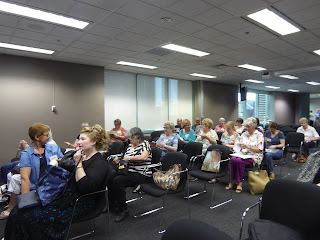July Reading Update
Well the Sydney weather has been cold, wet and windy, just right for curling up with a book.
As you know I try and read a book, whose author's surname starts with the letter of the month. Well have three months start with J stretched my author list.
January I did Penelope Janu.
June was Rachel Johns, could I read more of their books for July. No, I told myself that would be cheating.
This is where it's good to have friends that read and Deb recommended a book by Catherine Jinks, Traced.
Set in both 2020 and 2015, you soon become gripped by the story. 2020, Jen, a Covid contact tracer, makes a call and the woman on the other end panics. Her partner doesn't like her having visitors or going out, he has her phone and calls several time a day to make sure she is home, how can she explain this. Jen tries to reassure her that something can be done and asks the partners name. Jen immediately flashes back to 2015, when the same person did the same thing to Jen's family.
I don't want to give the story line away but it is a very powerful book.
After reading Traced, I needed a bit of light reading and went to Rachel John's, The Other Bridget. Fun and easy to read, I loved it. As the title implies there is another Bridget Jones and she is unlucky in love like the one from Bridget Jones' Diary. (Here I confess that I haven't read it or watched the movie.)
Bridget works at the local library and loves matching people to books. She befriends a young girl, who is ill and she also runs a book club, for seniors. Bridget also has a neighbour and they 'annoy' each other.
Read the book to find out all the twists and turns.
My next book was Sister Bullwinkle. The untold, uncensored story, by Lynette Ramsay Silver. Vivian Bullwinkle was the sole survivor of the Bangka Island massacre of 21 Australian nurses and one civilian woman, in February 1942.
This books retells Vivian's story and how she was censored from speaking the truth about what happened. Well research and well written, it is confronting as to what she and the other POW's went through at the hands of the Japanese.
I have read nine books, this month, with Ava Miles releasing her Dare Valley #5- The Town Square, continuing the Hale Family Saga.
Murder in Merrywell, by Jane Bettany caught my eye as well. Violet Brewster moves to Merrywell and opens her own business, recording memories. She is asked to record the village history and is soon caught up in a 40 year old mystery. Light and easy to read. I then read Murder at the Book Festival, also featuring Violet as she tries to find a missing person.
The Forever Witness: How Genetic Genealogy Solved a Cold Case Double Murder by Edward Hughes.
This is the blurb from Amazon as it explains it better than I can.
A relentless detective and a civilian genealogist solve a haunting cold case—and launch a crime-fighting revolution that tests the fragile line between justice and privacy.
In November 1987, a young couple from the idyllic suburbs of Vancouver Island on an overnight trip to Seattle vanished without a trace. A week later, the bodies of Tanya Van Cuylenborg and her boyfriend Jay Cook were found in rural Washington. It was a brutal crime, and it was the perfect crime: With few clues and no witnesses in the vast and foreboding Olympic Peninsula, an international manhunt turned up empty, and the sensational case that shocked the Pacific Northwest gradually slipped from the headlines.
In deep-freeze, long-term storage, biological evidence from the crime sat waiting, as Detective Jim Scharf poured over old case files looking for clues his predecessors missed. Meanwhile, 1,200 miles away in California, CeCe Moore began her lifelong fascination with genetic genealogy, a powerful forensic tool that emerged not from the crime lab, but through the wildly popular home DNA ancestry tests purchased by more than 40 million Americans. When Scharf decided to send the cold case’s decades-old DNA to Parabon NanoLabs, he hoped he would finally bring closure to the Van Cuylenborg and Cook families. He didn’t know that he and Moore would make history.
Genetic genealogy, long the province of family tree hobbyists and adoptees seeking their birth families, has made headlines as a cold case solution machine, capable of exposing the darkest secrets of seemingly upstanding citizens. In the hands of a tenacious detective like Scharf, genetic genealogy has solved one baffling killing after another. But as this crime-fighting technique spreads, its sheer power has sparked a national debate: Can we use DNA to catch the murderers among us, yet still protect our last shred of privacy in the digital age—the right to the very blueprint of who we are?
I also fitted in a seven day outback safari but early nights were great as I could read.





Comments
Post a Comment